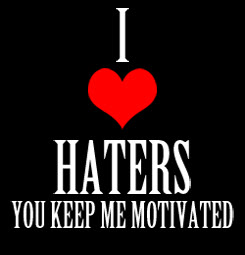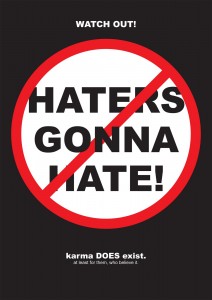Despite your efforts at being at peace with everyone around you, you still realise their’s still someone who is never pleased with your efforts. Even after putting your best into a creative work a lot of people applaud you for, you still hear derogatory comments from someone. You begin to wonder why they are never pleased no matter how much you try. You begin to feel you are not good enough, and your self esteem starts being affected. My first word for you is that no one is perfect-“Even to the exclusive, perfection is elusive.”
I read an article written by David Wong on Cracked.com called “6 Harsh Truths That Will Make You a Better Person.” One of the main points the author made was to do something, anything that could be of service to humanity in some way, no matter how small. But beware of haters. Any time you embark on trying to build or create something, there’s going to be people out there that don’t want you to succeed, and who may even try to sabotage your plans.
“Whatever you try to build or create – be it a poem, or a new skill, or a new relationship – you will find yourself immediately surrounded by non-creators who trash it” (Wong).
This really hit home for me because I’m someone who creates things, and I’ve had my share of dealing with haters. As a writer, I put my work out for the public eye to view. A lot of the time, people are respectful. They either comment about enjoying what they’ve read, or if not, offer some constructive feedback. But every so often, I get feedback that isn’t so pleasant or constructive.
In a writing workshop in college, one of the other students had commented on a story I wrote, describing it as “a bad episode of Friends.” Although the student was straightforward about how they felt, this particular statement doesn’t give any constructive feedback on how to make the story better.
Laura Preble, award winning writer and teacher, is not immune from the criticism of haters. Preble is in the process of writing a novel titled Out, in which homosexuality is the norm, and heterosexuals are the minority, and are criminalized. Homosexuals run the government, and have close ties with a powerful religious organization. In this tale, Chris Bryant, the son of a powerful minister and Carmen, a girl from a high social family, fall in love and challenge the traditions of their society.
My first reaction to reading the synopsis was that it’s a unique idea. The author is switching the societal positions of heterosexuals and homosexuals in order to get readers to sympathize with what homosexuals in our society have to deal with. A heterosexual person who reads this can put themselves in the shoes of the main characters. What if heterosexuals were the minority? What if the church believed that heterosexuality was wrong? And society wanted to rehabilitate them so that they would be homosexual like the rest of civilization? What if you risked getting yourself killed for falling in love with someone of the opposite sex?
After reading the synopsis, I thought the story idea was clever, but not everyone shared the same view. Some people misconstrued what the story was all about, and Preble got some harsh criticism from people who thought she was gay bashing.
Preble responded to the criticism in her blog: “This is interesting, especially considering the fact that the intent was the exact opposite. OUT is intended to allow people to step into the shoes of those oppressed, to get a visceral feeling for what it’s like to be ostracized because of who you are. It’s not condoning discriminatory behavior; on the contrary, it’s calling it out for what it is.” Preble believes those people have misinterpreted what the book’s message is.
Since the book is not out yet, there’s only a brief description of the book to tell readers what it’s about, and for whatever reason, maybe people got confused. She urges those people to read the book in its entirety when it becomes available, and then formulate an opinion, but not beforehand.
In “6 Harsh Truths That Will make You a Better Person,” Wong says, “Just remember, [haters are] only expressing their own fear, since trashing other people’s work is another excuse to do nothing.” He also says, “It’s so much easier [for haters] to just sit back and criticize other people’s creations.”
So next time you’re worried about putting yourself out there, putting your projects or creations out for all to see and judge, don’t let the fear of rejection or judgment stop you from your goals. You’re doing something, contributing something to the world. Even if not everybody gets it, someone may get it. It has value. Even if it’s a failed attempt, it has value. A failed attempt is better than no attempt. We won’t get better at something unless we try, and even fail. And if what you put out is of excellent quality, someone will criticize you anyway (as in Preble’s case). [Care2]
[Care2]




